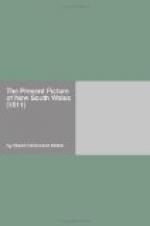Bakers—not to pay more than one shilling per bushel for grinding wheat into flour.
Barrack Bedding and Furniture—prohibited to be purchased: penalty—indictment for receiving stolen goods.
Boats—belonging to individuals, to land only at the Hospital-wharf, unless by permission; nor must any convey spirits without a permit, under penalty of being seized.
Boats—employed in the Hawkesbury trade, not to depart from thence, nor from Sydney, without three days notice of departure. In case of attack, to cut away masts and run on shore; and to be provided with an axe or tomahawk, under penalty of exemplary punishment. Those boats in the Hawkesbury river to be numbered, registered, and chained at night, and not to be rowed about after dark, under penalty of confiscation. No boat to convey any person on board a vessel after notice of departure, without permission from the governor or officer in command, under the penalty of the boat being forfeited to the informer, and five pounds to the Orphan School. And all boats must be registered and numbered, under the penalty of their being forfeited to the Orphans.
Boats—forbid being in Cockle Bay or Farm Cove, either ashore or afloat, after sunset, under the penalty of being forfeited to the crown; and all boats to be moored within the Hospital wharf, and hulk.
Boats conveying Grain from Hawkesbury.—No grain to be put into an open boat, or one that is not trust-worthy, or no complaint of damage therefrom cognizable; but if more grain be received than is consistent with safety, the master to make good all loss or damage, lose the freight, and pay five pounds for Orphans; and the same sum to that institution, if grain should appear to have been wetted, to increase its weight or measure.
British Seamen—forbid shipping in foreign vessels, during the war, under the penalty of fifty pounds.
Butchers.—None to vend carcase meat but such as are licensed, under the penalty of five pounds, and one year’s imprisonment. Licenced butchers to enter into recognizances to observe as follows:—Not to kill any breeding stock; nor to send live stock, or carcase meat, on board vessels, without permission; to deliver to the governor a weekly return of stock killed, purchased, and sold; not to demand more than one shilling and eight-pence per pound for beef, one shilling per pound for mutton, and eight-pence halfpenny per pound for pork; and not to sell meat by the joint, but by weight, under the penalty of forfeiting their licences and recognizances; the latter to the informer.
Cedar—growing at Hawkesbury, not to be cut down or removed without permission, under the penalty of confiscation, with that also of the boat or cart removing it, to public use.
Centinels—to oblige every person (except an officer) to advance, when challenged, and to confine every person who presumes to answer “Officer,” without authority; and when stores, etc. are to be placed in the charge of a centinel, application must be made to the serjeant of the guard, from whom he is to receive instructions, otherwise the centinel not to be accountable.




